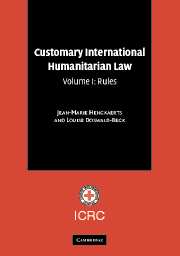Book contents
- Frontmatter
- Contents
- Foreword by ICRC President Jakob Kellenberger
- Foreword by Judge Abdul G. Koroma
- Foreword by Yves Sandoz
- Acknowledgements
- Introduction
- List of abbreviations
- Part I The Principle of Distinction
- Chapter 1 Distinction between Civilians and Combatants (Rules 1–6)
- Chapter 2 Distinction between Civilian Objects and Military Objectives (Rules 7–10)
- Chapter 3 Indiscriminate Attacks (Rules 11–13)
- Chapter 4 Proportionality in Attack (Rule 14)
- Chapter 5 Precautions in Attack (Rules 15–21)
- Chapter 6 Precautions against the Effects of Attacks (Rules 22–24)
- Part II Specifically Protected Persons and Objects
- Part III Specific Methods of Warfare
- Part IV Weapons
- Part V Treatment of Civilians and Persons Hors De Combat
- Part VI Implementation
Chapter 6 - Precautions against the Effects of Attacks (Rules 22–24)
Published online by Cambridge University Press: 05 June 2012
- Frontmatter
- Contents
- Foreword by ICRC President Jakob Kellenberger
- Foreword by Judge Abdul G. Koroma
- Foreword by Yves Sandoz
- Acknowledgements
- Introduction
- List of abbreviations
- Part I The Principle of Distinction
- Chapter 1 Distinction between Civilians and Combatants (Rules 1–6)
- Chapter 2 Distinction between Civilian Objects and Military Objectives (Rules 7–10)
- Chapter 3 Indiscriminate Attacks (Rules 11–13)
- Chapter 4 Proportionality in Attack (Rule 14)
- Chapter 5 Precautions in Attack (Rules 15–21)
- Chapter 6 Precautions against the Effects of Attacks (Rules 22–24)
- Part II Specifically Protected Persons and Objects
- Part III Specific Methods of Warfare
- Part IV Weapons
- Part V Treatment of Civilians and Persons Hors De Combat
- Part VI Implementation
Summary
Rule 22. The parties to the conflict must take all feasible precautions to protect the civilian population and civilian objects under their control against the effects of attacks.
Practice
Volume II, Chapter 6, Section A.
Summary
State practice establishes this rule as a norm of customary international law applicable in both international and non-international armed conflicts. This is a basic rule to which more content is given by the specific obligations contained in Rules 23–24. The practice collected in terms of those specific obligations is also relevant to prove the existence of this rule and vice versa.
International armed conflicts
The duty of each party to the conflict to take all feasible precautions to protect the civilian population and civilian objects under its control against the effects of attacks is set forth in Article 58(c) of Additional Protocol I, to which no reservations have been made.
Numerous military manuals restate the duty of parties to the conflict to take all feasible precautions to protect the civilian population and civilian objects under their control against the effects of attacks. This obligation is supported by official statements and reported practice. This practice includes that of States not, or not at the time, party to Additional Protocol I.
Non-international armed conflicts
The obligation to take all feasible precautions to protect the civilian population and civilian objects against the effects of attacks was included in the draft of Additional Protocol II but was dropped at the last moment as part of a package aimed at the adoption of a simplified text.
- Type
- Chapter
- Information
- Customary International Humanitarian Law , pp. 68 - 76Publisher: Cambridge University PressPrint publication year: 2005



